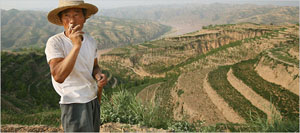CHENJIAYUAN, China - For many Chinese, an ancestor is someone to honor, but
also someone whose needs must be maintained. Families burn offerings of fake
money or paper models of luxury cars in case an ancestor might need pocket
change or a stylish ride in the netherworld.

Chen Xingwu, a farmer in Chenjiayuan, China,
said he was lucky to find a bride among the limited pool of available
women in rural areas. [New York Times] |
In villages like Chenjiayuan, Confucian family values are strong.
But here in the parched canyons along the Yellow River known as the Loess
Plateau, some parents with dead bachelor sons will go a step further. To ensure
a son's contentment in the afterlife, some grieving parents will search for a
dead woman to be his bride and, once a corpse is obtained, bury the pair
together as a married couple.
"They happen pretty often, especially when teenagers or younger people die,"
said Yang Husheng, 48, a traveling funeral director in the region who said he
last attended such a funeral in the spring. "It's quite common. I've been in the
business for seven or eight years, and I've seen all sorts of things."
The rural folk custom, startling to Western sensibilities, is known as
minghun, or afterlife marriage. Scholars who have studied it say it is rooted in
the Chinese form of ancestor worship, which holds that people continue to exist
after death and that the living are obligated to tend to their wants - or risk
the consequences. Traditional Chinese beliefs also hold that an unmarried life
is incomplete, which is why some parents worry that an unmarried dead son may be
an unhappy one.
In random interviews in different villages across the Loess Plateau, which
spreads across parts of Shanxi and Shaanxi Provinces, everyone acknowledged the
custom. People say parents of a dead son depend on an informal network of
friends or family, or even a well-connected fixer, to locate a family that has
recently lost a single daughter. Selling or buying corpses for commercial
purposes is illegal in China, but these individual transactions, usually for
cash, seem to fall into a fuzzier category and are quietly arranged between
families.
In some villages, a son is eligible for such a spouse if he is 12 or older
when he dies. None of the people interviewed considered the custom shameful or
overly macabre. Instead, it was described as a parental duty to a lost child
that reflected Confucian values about loyalty to family.
"Parents have a sense of responsibility for their son," said one woman, Li
Yinlan. She said she had attended ceremonies where the coffins were placed side
by side and musicians played a dirge. "They have this custom everywhere," she
said of her region.
The Loess Plateau, a dense warren of eroding canyons where some villages are
unreachable by roads, is separated from much of the change stirring up China.
Many young people have fled the arid hills, while those left behind struggle to
raise a crop. Many of the men left behind also struggle to find a wife.
The reason is that many women have left for work in cities, never to return,
while those women who remain can afford to be picky. No family would approve of
a daughter marrying a man too poor to afford a dowry and a decent future.
Families of the poorest bachelor sons sometimes pool their savings to buy a wife
from bride sellers, the traveling brokers who lure, trick or sometimes kidnap
women from other regions and then illegally sell them into marriage.
In the tiny village of Chenjiayuan, a farmer named Chen Xingwu, 57, stabbed a
spade into his field overlooking the Yellow River and said minghun represented
the final effort by parents to find a bride for a son. He said the parents of a
local disabled man were so worried their son would die before finding a spouse
that they recently gave a gold ring and earrings to a woman's family to secure
her as a bride.
| 1 | 2 |  |